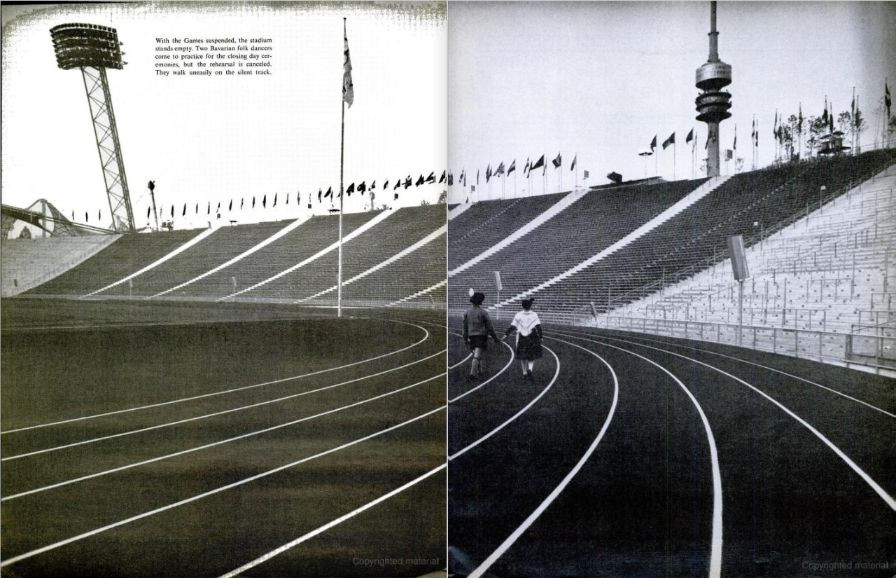On September 5, 1972, the world watched in horror as the Munich Olympics turned into a nightmare that would forever change the way we view sports and global security. The 1972 Olympic Tragedy remains one of the darkest moments in modern history, where 11 Israeli athletes were taken hostage and eventually murdered by Palestinian terrorists. This event shattered the illusion of innocence surrounding international sports and forced nations to confront the harsh realities of geopolitical tensions.
Imagine being at the peak of joy, celebrating the unity of humanity through sports, only for that moment to be violently interrupted. That’s exactly what happened during the 1972 Summer Olympics in Munich, Germany. What started as a celebration of athleticism and international camaraderie ended in tragedy, leaving an indelible mark on the hearts of millions around the globe.
This article dives deep into the events surrounding the 1972 Olympic Tragedy, exploring its causes, consequences, and the lessons learned. We’ll also touch on how this event reshaped global security measures and influenced future Olympic Games. Let’s take a closer look at this pivotal moment in history.
Read also:Lauren Simonetti Wiki The Ultimate Guide To Her Life Career And Achievements
Table of Contents
- Background of the Munich Olympics
- How the Tragedy Unfolded
- Who Were Black September?
- Security Flaws Exposed
- International Response
- Long-Term Impact on the Olympics
- Efforts to Remember the Victims
- Legacy of the Tragedy
- Modern Security Measures
- Conclusion: Lessons Learned
Background of the Munich Olympics
The 1972 Summer Olympics in Munich were supposed to be a celebration of peace and harmony. Dubbed the "Happy Games," the event aimed to showcase post-war Germany as a beacon of reconciliation and unity. However, beneath the surface, tensions simmered between nations, setting the stage for a catastrophe that would shock the world.
Why Was Munich Chosen?
Munich was selected to host the Olympics as a way to rebuild Germany’s image after World War II. The city invested heavily in infrastructure, creating state-of-the-art facilities designed to promote a sense of global brotherhood. Yet, despite these efforts, the Games became a backdrop for violence that exposed the fragility of international relations.
How the Tragedy Unfolded
At around 4:30 AM on September 5, 1972, eight members of the Palestinian terrorist group Black September infiltrated the Olympic Village. Armed with guns and grenades, they stormed the apartments housing the Israeli team, taking 11 athletes and coaches hostage. The world watched in disbelief as live television coverage broadcast the unfolding drama.
Key Events
- Black September demanded the release of 234 Palestinian prisoners held in Israeli jails.
- Negotiations broke down after German authorities failed to meet the group's demands.
- A botched rescue attempt resulted in the deaths of all 11 hostages, five terrorists, and one German police officer.
This sequence of events left the global community reeling, questioning the safety of hosting such large-scale events in an increasingly volatile world.
Who Were Black September?
Black September was a militant faction linked to the Palestine Liberation Organization (PLO). Formed in 1971, the group sought to draw international attention to the Palestinian cause through acts of terror. Their attack during the Munich Olympics was a calculated move to highlight the plight of Palestinians under Israeli occupation.
Motivations Behind the Attack
The group’s primary goal was to force Israel into releasing imprisoned Palestinians. By targeting the Olympics, they hoped to amplify their message on a global stage. Unfortunately, their actions only deepened divisions and sparked widespread condemnation.
Read also:Nice Clan Tags The Ultimate Guide To Stand Out In Gaming Communities
Security Flaws Exposed
One of the most shocking aspects of the 1972 Olympic Tragedy was the glaring lack of security at the Olympic Village. Athletes lived in a virtually unprotected environment, with minimal checks and balances in place. This oversight allowed Black September to execute their plan with relative ease.
German authorities, eager to avoid the militaristic image associated with Nazi Germany, intentionally kept security measures light. This decision proved catastrophic, as it left the athletes vulnerable to attack.
International Response
The reaction to the tragedy was swift and widespread. Leaders from around the world condemned the attack, calling it a violation of the sanctity of the Olympic Games. The International Olympic Committee (IOC) faced criticism for initially continuing the Games just hours after the massacre, but eventually suspended competitions out of respect for the victims.
Key Figures
- IOC President Avery Brundage came under fire for his handling of the situation.
- Israeli Prime Minister Golda Meir vowed revenge, launching Operation Wrath of God to target those responsible.
The international community rallied around the families of the victims, offering condolences and support in the wake of unimaginable loss.
Long-Term Impact on the Olympics
The 1972 Olympic Tragedy fundamentally altered the way the Olympics were organized. Security became a top priority, with subsequent Games implementing stringent measures to protect athletes and attendees. The event also sparked debates about the role of politics in sports, leading to increased scrutiny of how nations interact during international competitions.
Changes Implemented
- Increased security personnel and surveillance at future Olympic venues.
- Improved coordination between host nations and international law enforcement agencies.
- Stricter regulations regarding access to athlete housing and competition areas.
These changes ensured that the Games could continue to serve as a platform for unity while prioritizing the safety of participants.
Efforts to Remember the Victims
Over the years, various memorials have been erected to honor the memory of the 11 Israeli athletes and coaches who lost their lives in Munich. Despite initial resistance from some quarters, the IOC eventually recognized the importance of acknowledging this tragic event.
Memorial Highlights
- A plaque was installed at the site of the tragedy in Munich.
- The Israeli government established a national memorial day to commemorate the victims.
- In 2017, the IOC officially observed a minute of silence during the Opening Ceremony of the Winter Olympics in Pyeongchang.
These efforts help keep the memory of the victims alive, ensuring that future generations understand the significance of this historic event.
Legacy of the Tragedy
The legacy of the 1972 Olympic Tragedy extends far beyond the immediate aftermath. It serves as a stark reminder of the dangers that can arise when politics and sports intersect. The tragedy also underscored the importance of vigilance and cooperation in maintaining global security.
Today, the Munich massacre is studied by historians, political scientists, and security experts alike. Its lessons continue to inform policies and practices aimed at preventing similar incidents in the future.
Modern Security Measures
In the wake of the 1972 Olympic Tragedy, significant advancements have been made in the field of event security. Modern technology, coupled with enhanced coordination among international agencies, has significantly improved the safety of large-scale gatherings like the Olympics.
Technological Innovations
- Advanced surveillance systems and facial recognition software.
- Biometric scanning for athlete and attendee identification.
- Real-time threat detection and response capabilities.
These innovations demonstrate how far we’ve come in safeguarding the sanctity of international sports events.
Conclusion: Lessons Learned
The 1972 Olympic Tragedy was a watershed moment in history, exposing vulnerabilities in global security and challenging the notion that sports could exist in a vacuum free from political tensions. While the loss of innocent lives can never be undone, the lessons learned from this tragedy have helped shape a safer and more secure world.
As we reflect on this somber chapter in sports history, let us remember the victims and honor their memory by continuing to strive for a more peaceful and united global community. Share your thoughts in the comments below, and consider exploring other articles on our site for more insights into the intersection of history, politics, and sports.
Stay curious, stay informed, and never forget the power of learning from the past.


